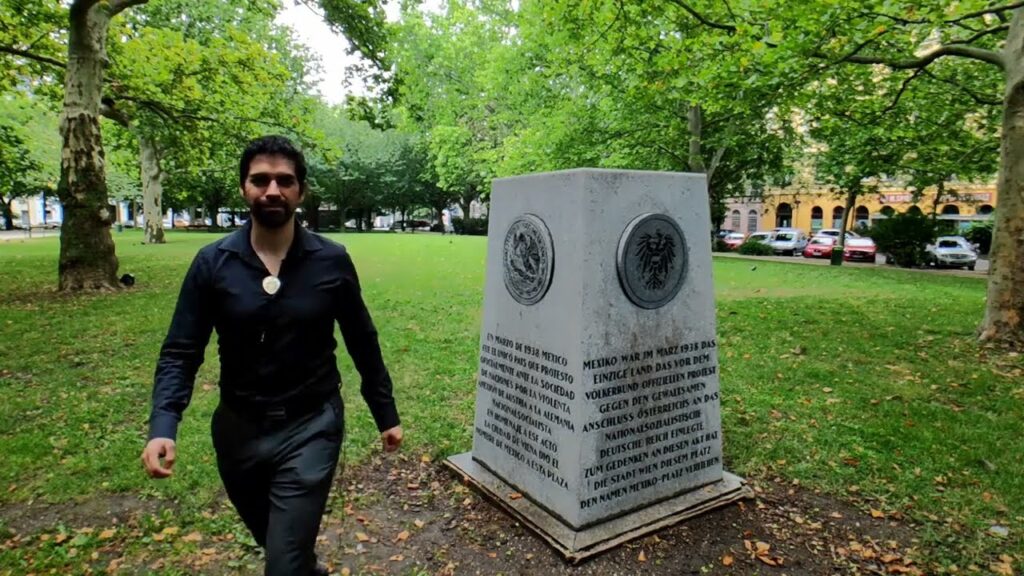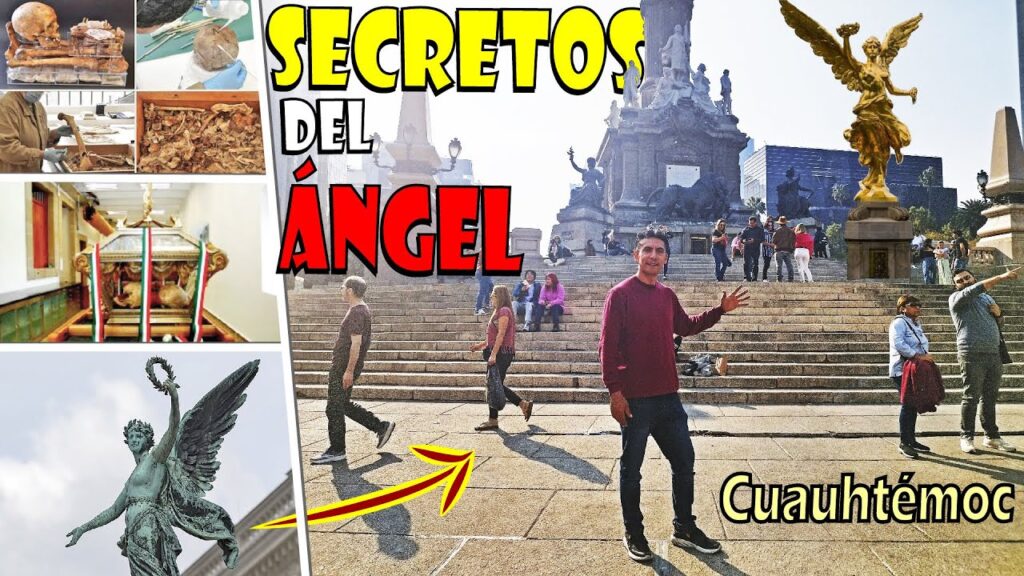Discover Mexikoplatz: A Tribute to Mexican Heroism in Austria
Amid the bustling cityscape of Vienna, tucked away in the serenity of the second district, lies Mexikoplatz, a picturesque square that stands as an homage to a unique historical bond between Austria and Mexico. This square was renamed in the 1950s to honor Mexico’s bold diplomatic stance during the Anschluss, when they were one of the few countries to protest against the annexation of Austria by Nazi Germany. Visiting Mexikoplatz offers not only a moment of reflection on past heroics but also an enchanting blend of art, history, and cross-cultural friendship.
At the heart of the square, visitors find a compelling memorial that exemplifies Mexican bravery and solidarity. Crafted by artist Jose Luis Cuevas, the monument features a stylized eagle — a national symbol of Mexico — which soars protectively over a map of the two nations, underscoring the distance Mexico traversed to extend its support to Austria. The sight of this profound marker in the midst of quaint cafes and Viennese hustle invokes a narrative of courage that contrasts and complements the local way of life.
Mexikoplatz not only tells the story of historical heroism but also continues to be a place of cultural convergence. Throughout the year, the square hosts a bevy of events, including Mexican markets and music performances, weaving the vibrant threads of Mexican culture into the Austrian tapestry. A visit here is not merely a physical journey but a leap across time and continents to experience the rich tapestry of human solidarity and the enduring ties it fosters across nations.
The History Behind Mexikoplatz: Mexico’s Impact on Austrian Heritage
One might wonder how a square in Vienna, Austria, came to be named ‘Mexikoplatz’, seemingly an ocean and a continent away from its namesake. The story reaches back into the tumultuous times of the early 20th century. During World War I, Austria-Hungary and Mexico were on opposite sides of the conflict, yet it was after the war that a profound connection developed between the two countries. Austria, facing devastation and loss, found a friend in Mexico, which extended diplomatic recognition to the newly established Republic of Austria in 1920, well ahead of many other countries.
The gesture of diplomatic recognition by Mexico was not soon forgotten. It laid the foundation for a lasting friendship, which was later cemented during one of Austria’s darkest times. In 1938, when Austria was annexed by Nazi Germany, Mexico was one of a few countries to openly protest against the Anschluss (annexation) and refused to recognize the occupation. This act of defiance was a beacon of support for Austrian sovereignty and independence.
The solidarity shown by Mexico during the years that followed only strengthened the bonds. After World Steel Trade War II, Mexico continued to support Austria, assisting in humanitarian projects and rebuilding efforts. The two nations shared a bond of resilience and understanding that transcended their cultural differences, promoting mutual respect and cooperation in various fields including arts, science, and education.
In 1956, in honor of Mexico’s unwavering support and the burgeoning cultural exchange, Austria renamed the square in the 2nd district of Vienna to ‘Mexikoplatz.’ This symbolic act commemorated the friendship and solidarity between Austria and Mexico, serving as a reminder of how historical events shape international relationships. Mexikoplatz remains a testament to Mexico’s impact on Austrian heritage, a focal point of gratitude, and a place of interest that continues to attract visitors and historians alike, curious about its unique backstory.
Visiting Mexikoplatz: What to See and Do at Vienna’s Mexican Square
Mexikoplatz, situated in the heart of Vienna, Austria, is a square steeped in historical significance and rich cultural exchange. While the name might suggest a focus solely on Mexican culture, the square actually serves as a bridge between Austria and Mexico, celebrating the friendship and bonds between the two countries. Visitors are often intrigued by this unique blend of cultures in the midst of traditional Viennese architecture.
The square itself is named in gratitude for Mexico’s support of Austria during the post-World War II occupation. One of the highlights of Mexikoplatz is the memorial plaque that commemorates this support, providing a poignant history lesson for those unfamiliar with this international relationship. It’s a reminder of the far-reaching effects of diplomacy and mutual support among nations.
Seasonally, the square transforms into a hub of festivities and events that showcase Mexican culture. During these events, visitors can indulge in authentic Mexican cuisine, ranging from street tacos to more intricate dishes that fuse Austrian and Mexican flavors. Additionally, the sounds of live Mariachi bands often fill the air, further enriching the immersive experience of being in Mexikoplatz and celebrating the vibrant Mexican heritage.
Apart from events, Mexikoplatz is also home to various Mexican-themed shops that sell traditional crafts, clothing, and artwork. These shops are not only a feast for the eyes with their colorful displays but also offer visitors a chance to take a piece of Mexican culture with them, be it a hand-woven textile or a piece of intricate silver jewelry. They are perfect spots for finding unique gifts and souvenirs to remember your Vienna travels.
For those with an interest in architecture, the nearby Mexikoplatz U-Bahn station, with its distinctive design, is not to be missed. The station serves as a gateway for travelers exploring the square and the surrounding district, and it stands as a modern contrast to the historic elements of the area. Mexikoplatz provides a blend of the old and the new, the foreign and familiar, making it a must-visit location on any Vienna itinerary.
Cultural Exchange: How Mexikoplatz Symbolizes Mexican-Austrian Friendship
In the heart of Vienna, you’ll find a unique tribute to international friendship: Mexikoplatz. This public square, named after the North American nation, stands as a symbol of the enduring bond between Mexico and Austria. The cultural exchange between these two countries extends beyond mere diplomatic relations and is immortalized in this shared space that daily sees Austrians and international visitors alike pass through, often pausing to consider its significance.
The history behind Mexikoplatz is both poignant and powerful. During World War II, Mexico was one of the few countries that openly opposed the annexation of Austria by Nazi Germany. In a bold demonstration of solidarity, Mexico refused to recognize the Anschluss, offering a voice of support to Austrian independence. This principled stand was not forgotten, and in 1956, the city of Vienna chose to rename the square previously known as “Platz der Heiligen Brigitta” to honor this act of Mexican defiance and friendship.
Cultural manifestations in Mexikoplatz further illustrate the mutual respect and collaboration between the two cultures. Visitors can explore art exhibitions, musical performances, and culinary events that oftentimes highlight Mexican traditions and heritage brought to Vienna. These events are a testament to the bridge built by Mexikoplatz, fostering a sharing of cultural wealth that perpetuates mutual understanding and appreciation.
The interplay of Mexican and Austrian cultures has also influenced the aesthetic and atmosphere of the square. Architectural elements inspired by Mexican design can be observed, providing a visual representation that complements the square’s historical significance. The space becomes a living canvas for international narrative, a testament to the idea that places can hold deep geopolitical meaning and serve as conduits for cultural exchange.



